Description
Current concise reviews of the albums by adult alternative, contemporary, and crossover artists. Images
of album artwork and links to both internet-based resources are always included. Click on the title to
view the article.
Content
Summer
Rachael Sage
Catrin Finch
Laura Berman
Carla Werner
Steve Howe's Remedy
Adiemus
Carina Round
Carina Round
Mostly Autumn
Asia
Yoko Ueno
Links
Digest Index
More Digest Entries
Previous Digest Entries
Current Digest
Instrumental Digest
|
 |
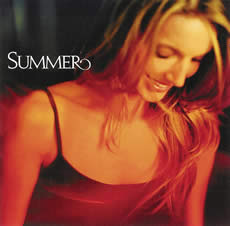
Image © Sony Classical 2003

Image © Sony Classical 2003
|
|
(17 August 2003) Summer is a classically trained vocalist whose rich, sumptuous voice can soar effortlessly over music written by some of the world's all time greatest composers; Beethoven, Vivaldi, Strauss, Rodrigo, Sting, and Ennio Morricone are just some of the names from the past and present whose music Summer has chosen to present on her self-titled debut album (Sony Music Entertainment Ltd (UK) SK89879) released in April 2003. Although Summer's debut album is more classically styled than others in the crossover genre, it will appeal to enthusiasts of Sarah Brightman review), Emma Shapplin (review), Izzy (review), Filippa Giordano (review), Sasha Lazard (review) and Laura Turner (feature). Summer is comprised of twelve tracks the artist personally selected and in several cases arranged by the singer herself. Produced by Nick Patrick (Gipsy Kings, Russell Watson), guest musicians include bassist Pino Palladino (Celine Dion, Peter Gabriel, Eric Clapton), keyboardist Richard Cottle (Mick Jagger, Manic Street Preachers, Vanessa-Mae), guitarist Dominic Miller (Sting), percussionist Miles Bould (John Martyn, James Asher) and renowned orchestral arranger and conductor Nick Ingman who, on this album, conducts the Royal Philharmonic Orchestra. "Putting the album together was exciting and the realisation of a dream," says Summer. "It features a huge range of styles and songs. I really wanted to get across not just the fact that I'm an opera singer but that I love singing everything from purely classical pieces to jazz, world and pop." In an effort to bring something different to the table, Summer sought out pieces from around the world and blended them to create an exquisite mix of classical music, world influences, new arrangements and timeless lyrics. What separates Summer's debut from anything that has gone before is the seamless fusion that has been achieved between the classical and ethnic musical idioms, a fusion that takes nothing from either genre, but rather adds to both and creates a style that is both emotively powerful and intellectually satisfying. The clearest analogy is the combination of jazz and roots that has made Norah Jones debut album review one of the top selling albums on 2002. The Summer album includes the exciting opening number "Nella Fantasia" by Ennio Morricone with lyrics by Chiara Ferrau; the Spanish song, "Palabra De Honor," which was a huge hit for the Gipsy Kings; "Aranjuez ma Pensee," an arrangement of the Guitar Concerto written in the 1930s by Spanish composer Joaquín Rodrigo with lyrics by Victoria Kahmi; an exquisite French lullaby "Berceuse" by the the 19th century composer Benjamin Godard; the beautiful "Song To The Moon" by the 19th century composer Antonin Dvorák with lyrics by Jaroslav Kvapil; and an extraordinary cover of Sting's song "Fragile."  Read further reviews, listen to soundbites and order the album from amazon.comhere. Clearly worth a trans-Atlantic journey, Summer's debut album is a must listen! Read further reviews, listen to soundbites and order the album from amazon.comhere. Clearly worth a trans-Atlantic journey, Summer's debut album is a must listen!
|
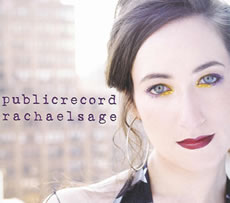
Image © Mpress Records 2003
More Rachael Sage
Interview and Reviews
Painting Of A Painting
Illusion's Carnival
Public Record
|
|
(17 August 2003) The fifth album from New York's award-winning Rachael Sage comes on the heels of her stunning contribution of "Twentieth Century Fox" to the Love Her Madly, a compilation of Doors covers by new women artists (review).Public Record (Mpress Records (USA) MP9090-2, 2003) is comprised of fourteen alternatively styled singer songwriter tracks picking up quite naturally where Illusion's Carnival--the artist's 2002 offering--left off. Our editorial staff were exposed to the album in both pre-mastered and final production versions. Interested visitors will likely have already explored our coverage of several related artists Bernadette McCallion (review), Dor Lata (review), Evelyn Downing (feature), Mermaid Kiss (feature), Jo Gabriel (feature) and prior albums by Rachael Sage (links below album cover, left). The evocatively sensual vocal delivery Rachael has honed since her 1996 debut album draws listeners to her recordings. She continues the journey here. Rachael contributes vocals, piano, wurlitzer, mellotron, voco strings and lofi loops and is responsible for the album's songwriting as well. The band features Doug Yowell (drums), Dean Sharp (drums), David Rosenberg (percussion), Ben Butler (acoustic and electric guitars), Walter Parks (electric guitar), Stephanie Winters (cello), Julia Kent (cello), Conrad Korsch (upright and electric bass), Mike Visceglia (bass), Richard Gates (bass), Jack Petruzelli (guitar loops and hammond organ), Trina Hamlin (harmonica, tambourine, acoustic guitar), Russ Johnson (trumpet and flugelhorn), Allison Cornell (viola, violin) and Jenny Bruce (background vocals-review). Like Rachael's earlier recordings, the material is heavily laced with sensitively played piano arrangements and delicate vocalisations. Additional arrangements make some of the material--like the gently rocking "What If" opener--more robust and at times the memorable melodies make it more accessible. But it's the piano-backed material, like the closing number "Frost," that links Public Record most to Rachael's earlier work. Additional vocal effects and lush backing harmonies contribute to the development illustrated in this recording. "Too Many Women" perfectly captures the artist's development. Evocative verses accompanied by tender piano playing are joined with richly arranged choruses in this album standout. With excellent songwriting and an extensive supporting cast of additional musicians, listeners will find--as our editors did--wonderfully lush arrangements on Private Record. Strings, horns and harmonica as well as backing vocal layers add tremendous texture to the material. The arrangements in "Bravedancing," "Chasing The Girl" and "Someone Save Me," for example, demonstrate the virtuousity of the band. We especially enjoyed the instrumental support in these tracks with piano, strings and guitar working perfectly behind Rachael's evocatively delivered vocal lead. Public Record again illustrates why Rachael Sage is one of the leading women in New York alternative music. A stunning progression from her prior work, it is certain to draw further critical acclaim. Rachael tours widely--check her website for dates and venues.  Read further reviews, listen to soundbites and order the album from amazon.comhere. Clearly worth a trans-Atlantic journey, Public Record is a must listen! Read further reviews, listen to soundbites and order the album from amazon.comhere. Clearly worth a trans-Atlantic journey, Public Record is a must listen!
|
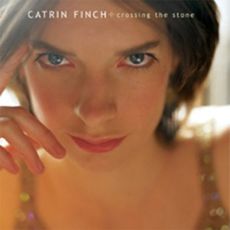
Image © Sony Classical 2003
|
|
(20 October 2003)Although the Welsh harpist Catrin Finch is only 23 years old, she has already been able to get the status of a virtuoso musician worldwide. Catrin is the first female harpist to whom The Prince of Wales granted the prestigious, traditional position of The Royal Harpist in 2000, another Welsh celebrity Karl Jenkins asked her to become involved in making the previous Adiemus album, Adiemus IV - The Eternal Knot. In addition, HRH The Prince of Wales commissioned even more music from Karl, and the result was a double harp concerto based on a Welsh folk tune "Over The Stone". After the work was premiered in Wales in 2002, Karl Jenkins became a producer of her next album, composed some more music for it, and the album Crossing The Stone (Sony Classical (UK) SK87320, 2003) was born. Stylistically the album is a rainbow of various musical styles, and in addition to the original compositions of Karl himself, he has also arranged some very interesting pieces for the album. Most of the double harp concerto movements have been included, as well as very fine and, more or less,modernised versions of some famous classical tunes. Catrin is accompanied by the Prague Philharmonic Orchestra, with Karl Jenkins as a conductor, but there are also pieces of solo harp included. The album starts off with a really exciting arrangement of Dave Grusin's "Mountain Dance." I haven't been able to hear the original version as yet, but already the first track shows how well even jazz music fits to be played by the harp! And the excitement just doesn't stop there, since the next track, an original Karl Jenkins composition called "Harpers Bizarre", multiplies Catrin's harp by 8 times and is aptly described as "minimalism meets the blues"! Reminds me a lot from Karl's work in Nucleus during the early 1970's before he joined Soft Machine. The third track is also hugely jazz-oriented, and it's a small wonder because the composer of the piece "James" is Pat Metheney. I don't know how much the harp students around the world really play jazz things during their instrument lessons, but this track shows once again the versatility of the harp as an instrument! Simply stunning, and Catrin really seems to toy easily with the harp. After this Catrin moves on to a more "classical"/contemporary direction for a while, by performing the fourth movement from Karl's "Over The Stone" (Tros Y Garreg in Welsh) Double Harp Concerto, and Bach's Prelude from Violin Partita No.3. Karl Jenkins really shows his respect towards the music from his home area on the arrangement, while the Bach transcript for the harp has been made by a French harpist Marcel Grandjany. Great pieces both. The sixth track represents contemporary music again, being the third movement of Steve Reich's work "Electric Counterpoint". Here Catrin's playing has been even more multi-tracked, this time up to 10 times, so it sounds really interesting indeed! Next track is again from Karl's Double Harp Concerto, entitled "Eternal Dream"--original name was in Latin "Somnium Aeternum"--and this dream-like piece features even recurring heartbeat effects that were not used in the premiere concert. But the dream doesn't last very long, since the next piece, an arragement of Händel's "The Arrival of The Queen of Sheba", is once again full of energy and interesting twists and turns. The handclaps provide even a bit Spanish influences for the piece, and to get it sound even more ethnic, Karl has added some Arabic percussion sounds (rek, darabuca, duf) into his arrangement! A master of mixing things up, so to say, but in a positive meaning. Next up is the sixth movement of Karl's Double Harp Concerto, entitled "Café Vamp Latino", and typically for Jenkins, also this features both rhythmical complexity and some tonal surprises as well! As if the musicians were just having fun together. Some would say that drawing material from so many musical genres and composers is recommendable for collection albums only, but I think that in this case it's inapproppriate to say like that. The next two tracks are, in fact, from quite different territories; whereas a track "Spain" has been composed by Armando "Chick" Corea, the track following it, "Buenos Aires Hora Cero" has been composed by Astor Piazzolla! Both pieces have been arranged for the album by Karl, and especially the latter of these sounds very interesting. The latter piece is especially full of energy, and Catrin uses fairly unique effects in addition to her playing. Namely, who would have guessed that the sounds come from the harp as Catrin makes glissandos, harmonics, pedal slides and even hitting the soundboard of the harp! This would be very interesting to be seen live in concert as well, or it could also be a part of a horror movie soundtrack. The next two pieces are again arrangements of classical music, first of them being a very modernised version of Claude Debussy's "Clair de Lune." The sampled radio effects in the beginning are very interesting indeed, and it sounds like a normal radio listener stumbles across the piece accidentally! And as the performing instrument here is the harp, I began to think that Debussy should really have composed the piece for the harp instead of piano. It's almost unbelievable to know that the famous "Gounod-Bach" piece "Ave Maria" was originally "only" a piano prelude, and that the lyrics were added to the Bach prelude by Charles Gounod some 137 years later. First Catrin plays the prelude quite fast as soloist, and then a countertenor Terrance Barber joins in, forming a wonderful, heartfelt duet mood for the piece. Terrance's voice blend really well to the arrangement, and gives it the final polish. After these relaxing pieces Karl takes up the responsibility of the composer again, providing a very memorable, catchy and whirling Celtic-sounding piece "Thingamujig". This bouncing, happy and quite Adiemus-sounding (though instrumental) track, and the pennywhistle player Rose Hillier really comes to her own. Although Crossing The Stone is mainly an instrumental album, the next piece makes yet another exception for that. As most of us know that both Catrin Finch and Karl hail from Wales, the choice of a traditional Welsh lullaby "Suo-Gân" seems to be a perfect choice for the album track list. On Karl's arrangement there are two vocal soloists singing the verses, first one can hear the voice of Caryl Ebenezer (who also was involved in making Adiemus IV album together with Catrin) followed by Terrance Barber. Once again, th singers' voices blend smoothly together with the sound of the harp. Personally I would have put the final track of the album earlier to the track listing since I like smooth album conclusions, but the last track on the album is still quite interesting. Karl's son Jody has been heavily involved in both arranging and performing the percussion parts of this album, but he also shows his great skills of arranging music with the last track, an arrangement of the first movement of Karl's work Palladio. As I have heard another "pop" arrangement of this particular movement (by a string quartet "Bond") before this, the idea of modernising this is not strange for me. Therefore I think that this rendition is equally good with the one by Bond! Catrin has used an electric harp to boost the modernity even more, and she also shows her stunning skills of playing the instrument so fast Once again it is difficult to categorise the album, I see this as a richness rather than being too diverse, and I really would like to see Catrin Finch touring other countries than just UK and those of USA and Asia. Of course this album is really worth for having for any Karl Jenkins and/or open-minded harp music fan, but making it live would be even more exciting!--Suvi Kaikkonen Read further reviews, listen to soundbites and orderthe album from amazon.comhere.An album certain to interest long time Adiemus fans in its development from previous works and introduce Catrin's solomaterial to new listeners, further investigation is certainly worth a journey. its development from previous works and introduce Catrin's solomaterial to new listeners, further investigation is certainly worth a journey. 
|
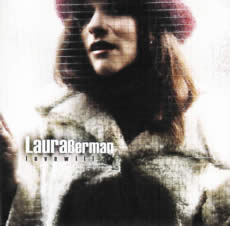
Image © Orange Ray Music 2003
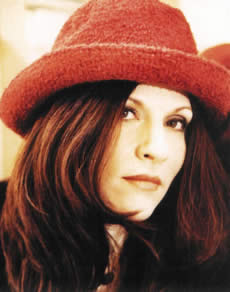
Image © Orange Ray Music 2003
|
|
(25 October 2003) Laura Berman is a classically trained vocalist and pianist who has has been writing and performing her original material since 1995. Laura's manager introduced Musical Discoveries editors to her music several months ago and it has been in rotation for review until now. Her debut album comes on the heels of her somewhat unconventional and regular distribution of her earlier live material. Entitled Lovewill (Orange Ray Music (USA) OR0301B, 2003), the album is a nine-track collection of folk, rock, jazz and blues tunes. Laura orchestrates her songs in fashions that some find similar to Joni Mitchell, Sting and Carole King, and others say her voice resonates with the influence of singers like Anita Baker, Vonda Shephard and Alana Davis. Laura is ably assisted by a bevy of supporting musicians on the album. In addition to providing all vocals, Laura also plays piano. The lineup is completed by Alex Rastopchin (electric guitars), Richard Oliver Furch (Hammond B3, Wurlitzer, Mellowtron, Rhodes, organ), Victor Rice (bass), John Macaluso (drums), Chris Benelli (percussion), Malcolm Gold (bass) and Craig Benelli (electric guitars). The album was recorded at Unique Recording Studios in New York, mixed by Richard Oliver Furch, engineering by Doug Robertson II, Nic Hard and Richard Oliver Furch and was produced by Laura Berman. Writing credits go primarily to Laura although the piece "Love Will" was co-written with Richard Oliver Furch. Laura's voice comes through extensive training and Gospel, folk and pop influences. She has served as backup vocalist for Grammy-Award winner Enya on the David Letterman and Rosie O'Donnell shows and performed with Shawn Mullins, Edwin McCain and Angie Aparo at Atlanta's prestigious Eddie's Attic. In 2001, Laura received an honorable mention in the John Lennon Songwriting contest for her song "Grace in Me." With songs like "Call Me Yours," which speaks of a personal relationship with an angel, the blues-jazz romp "Acrobat," and the simply acoustic inspiration called "I've Found My Own," it's no wonder Laura has developed a dedicated fan base. As one reviewer plainly writes, "Comparisons may abound for those left speechless by the girl's talent, but I prefer to be refreshed by her originality". The album opens with a unique--and bluesy-- interpretation (to our ears) of "Amazing Grace" entitled "Grace In Me." Electric guitar, crisp percussion and Hammond add tremendous texture under Laura's soulful vocal delivery. The instrumental bridge immediately demonstrates the band's strength. We especially enjoyed the vocal mix of the evocative ballad "Call Me Yours." "Love Will," the album's title track, is an upbeat rhythmic gently rocking track--instrumentals are extensively percussive and work well alongside Laura's vocals. "Acrobat" is a variation in style, this time turning to jazz; vocals are soulful and accompanied effectively primarily by bass and percussion. The track "Walk In The Clouds" is a more accessible rock tune--and certain album standout--with guitar arrangement supporting Laura's sensual vocal delivery. That the arrangements can be so strong without drowning out her vocal performance attests to the power of Laura's vocal delivery. The gentle folk style acoustic ballad "Good Morning" is also certain to please a broad range of listeners. Accompanied primarily by piano, the torch ballad "I'm Staying" is a precious and tremendous tribute to Laura's heartfelt singing and songwriting. The thicker electronic arrangement and crisp percussion of "Sweet Soulmate" when coupled with the wider extremes of Laura's vocal range make this mid-tempo track an album standout. The album concludes with the lightly arranged ballad "I've Found It On My Own," in which Laura's vocals are mixed way up, well above the bass. It is clearly a tribute to her vocal talent. Laura regularly performs in the New York City area and we understand that her live performance is outstanding.Laura Berman's album Love Will should be explored further. Available from CD Baby, it is a very nice listen. 
|
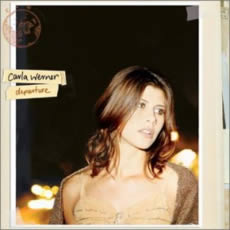
Image © Columbia Records 2003
|
|
(27 September 2003)Recorded with four producers on three continents over two years by one woman, Departure represents the artistic coming-of-age of Carla Werner, a musician who began her career signing country music in competitions in her pre-teens and is now realizing her dreams and articulating her vision. She was born and raised in New Zealand, where her father worked as a dairy farmer. "I was exposed to the 'harsh realities' of life at a very early age,"she says, remembering things down on the farm. "You learn respect for what you have, the great chain of events. It's a very wholesome way of growing up and it's really enriching for a kid to be exposed to that sort of stuff. We were really imaginative as kids, we weren't allowed to watch that much television." Growing up, Carla was exposed to a lot of music. Her father "had a really good record collection: Bob Marley, Neil Young, The Eagles, Abba, bits and pieces of everything" while his father, Carla's grandfather, played in a band called the Country Boys and, nearing his 80's, "still writes and demos". Her mother's side of the family featured many singers, though "none of them pursued it professionally." Her upbringing would often be filled with impromptu musical parties, with guitar music and singing. "As far back as I remember," she recalls, "I was always singing around the house. I would go and grab something - shampoo bottles, the beads in the doorway - and mimic a microphone as I'd sing along to records." A hidden track on Departure is an audio snapshot of a 5-year-old Carla singing a song of her own creation in the shower. While still in her early teens, she relocated to Australia in order to live with her mother and siblings. The move proved to be a "huge culture shock" for Carla, who'd begun to establish a "small, but credible reputation in New Zealand." Disillusioned by the pressure of competitive performing, she quit. "I'd given up music at 16," she confesses. "I'd done it for so long and I couldn't handle the competition aspect. Music had to be on my own terms. I wanted to come back in a different form, not singing in competitions." At the age of 19, Carla decided to move permanently to Sydney in order to "get back into my music. It was the first time I'd lived in the city, squished up with such diversity and culture and music was teeming out of clubs and pubs. It was a great source of inspiration." The eleven songs featured on Carla's debut album Departure are smartly-crafted melodies which are imbued with a real sense of gravity attributable to exceptional lyrics. Comparatively, Carla's music shares some commonalities with the Cowboy Junkies, Chris Isaak, Heather Nova (feature),Canadian folkie Mae Moore, and Patsy Cline. Like the foregoing artists, Carla's music has a rich and mellow quality that fits almost any mood or season. The majority of the tracks feature a wide range of acoustic and electric guitars, string accompaniment and percussion. Even while maintaining a seemingly straightforward folk/rock musical face, closer listening to Departure reveals exceptional production and performance values. This may be due to her team of producers which include Carmen Rizzo (Delerium, Paul Oakenfold),John Holbrook (Natalie Merchant, Jewel) and Lucius Borich. The highlight, of course, is Carla's bluesy and intimate vocals that lend a distinctive and lush timbre to the entire album. One of the highest compliments that can be given to Carla Werner is that each track on Departure carries the listener through a range of subtle shades of emotion. There is nothing "in your face" about any song on this album. Instead, the individual tones of each song provide an almost imperceptible shift in mood and ambience. For example, the warm and free-spirited "Heaven is a Word" is the perfect sound for a summer vacation trip. In similar vein, "Love you Out" is a melodically sweet and quirky piece featuring acoustic guitar and undulating strings. Although deceptively simple, the song actually incorporates smart chord changes and poetic lyrics resulting in a highly statisfying song. The breezy "Enough" perfectly touches that point between jazz and folk with laid-back brushed percussion and chill vibraphone effects. On Departure Carla moves into k.d. lang territory by crafting a cool folk/rock/retro number. It is a great pleasure to hear the full power of Carla's voice as it washes over the acoustic and electric instrumentation. The opening late-hour strains of "Crimson and Gold" call to mind some of Gordon Lightfoot's classic melodies. However, this "afterglow" mood is shaken up quite masterfully as the song breaks into an almost alternative power rift in the middle of the song. A great and original track. The closing track, "Iodine Red" is a knock-down brooding powerhouse. It is rare in popular music to hear a song that, when it begins, almost demands that you pull your car over and listen in awe. "Iodine Red" is just that sort of song. Layered with acoustic, electric, and "Spaghetti Western" guitars, strings and deep Moog bass "Iodine Red" is a wonderfully intense listening experience. The lush romaticism and tragedy invoked by Carla's voice makes this song truly unforgettable. It is not an overstatement to predict that this song may become a genuine folk classic. Read further reviews, listen to soundbites and order the album from amazon.com here.Carla Werner shows surprising maturity as a songwriter and lyricist. Columbia Records can only be proud of this emerging artist who merits serious attention from the music world.  Departure is one of those albums that you will never want to be without no matter where you are, what you are doing, or who you are with.--Justin Elswick Departure is one of those albums that you will never want to be without no matter where you are, what you are doing, or who you are with.--Justin Elswick
|
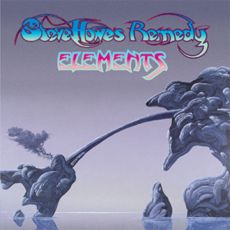
Image © InsideOut Music America 2003
|
|
(10 October 2003) Steve Howe’s latest album Elements (Inside Out (USA) IOMA 2066-2, 2003) is a group affair--under the moniker Remedy-- incorporating rock, blues, jazz and country as only Steve Howe can do. Featured on the CD are Virgil Howe (Keyboards and harmony vocals), Gilad Atzmon (sax, clarinet and flute), Derrick Taylor (bass) and Dylan Howe (drums). This CD is absolutely stunning and this is no small feat considering how many different styles of music this CD offers and Steve and his band pull it off beautifully. It opens with "Across the Cobblestone" a rocking number featuring Steve on lead vocals. Excellent synth work from Virgil as well as outstanding drum work from Dylan Howe set the pace for the CD. "Bee Sting" is an instrumental featuring Steve's blistering lead guitar work throughout and Dylan laying down some very impressive drum tracks. This track sees Steve revisiting his straight forward rock style that hasn’t been heard since his Turbulence album and is a welcome return to form. "Westwinds" is a breezy jazz number scored by Andrew Jackman from Steve's original arrangement. Reminiscent of the 60's spy film soundtracks this track is a real departure from Steve and he pulls it off brilliantly-a stand out track not to be missed. "Where I Belong" finds Steve back in familiar territory with his classic finger pickin style accompanying himself with a variety of electric and acoustic guitars. Steve vocals add a nice touch to this track and fit right in with this brisk tune. Listen to the last minute for some extraordinary soloing. "Whiskey Hill" a short bluesy straightforward number features fine lead distorted electric guitar work while "The Chariot of Gold" features a brass section and is similar in style to "Bee Sting" also being a straight forward rock piece with a brass section background that fits in perfectly. Gilad Atzmon shines on lead saxophone. "Tremolando" - well, the title speaks for itself. It's just Steve and features brilliant tremolo guitar work as well as a gorgeous melody. "Pacific Haze" finds the band back in the blues/jazz territory again. Steve's clean guitar works perfectly on this track. Andrew Jackman’s brilliant brass section arrangement suits the mood of this piece perfectly as does Dylan's stellar drumming. Lead sax and guitar bring the song to a swirling end. "Load off My Mind" finds Steve handling lead vocals again. A brisk track with some excellent brush work from Dylan. Virgil really shines on this track with a stunning short synth solo. "Hecla Lava," a solo guitar piece finds Steve back into progressive territory combining echo guitar and synth guitar multilayered for a real psychedelic sound that is very reminiscent of his classic guitar work with Yes. "Smoke Silver," is a highlight from the CD as it features some very impressive guitar work from Steve. This piece starts off in Rock territory and moves into a jazz/progressive feel by the end of the song. "Inside Out Muse," a bluesy track with clean lead guitar, is a perfect vehicle for Steve to shine and he takes full advantage of that. Gilad is featured prominently on clarinet as well. "Rising Sun" the most driving rock number on the CD finds Steve exploding on lead guitar accompanied perfectly by the outstanding brass section. Dylan driving the piece home with his pounding drums. A lead sax solo at the end brings this rocker to a powerful end. "Sand Devil" a solo guitar piece finds Steve on Synth guitar again starting with a church organ effect and working his way through various types of synth guitar sounds. "The Longing" starts with some very powerful synth from Virgil with a tribal backbeat from Dylan. Synth guitar is also featured prominently making this a most unusual but excellent piece of music. "A Drop in the Ocean" brings the CD to a tranquil end with a gorgeous melody. The guitar work is haunting and the sheer beauty of this track make for an excellent end to a stunning album. Elements cosmic landscape artwork created by Roger Dean make for a stunning cover. Overall this album is the best work from Steve since his 1979 The Steve Howe Album. This is the album his fans have been waiting for. Incorporating all different styles of music this is a must for any fan of great music and outstanding musicianship.--Scott Bassin Read further album reviews, listen to soundbites and order the album from amazon.com here. Recommended to Yes enthusiasts as well as fans of Steve Howe's solo work, Elements is by all counts a must listen! here. Recommended to Yes enthusiasts as well as fans of Steve Howe's solo work, Elements is by all counts a must listen!
|
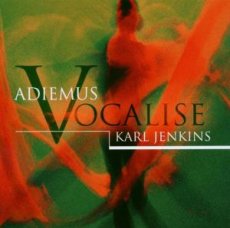
Image © EMI Classics 2003
More Vocalise Reviews
Suvi Kaikkonen
More Adiemus
Adiemus IV - The Eternal Knot
Adiemus Live
Adiemus Live (March 2001)
|
|
(19 October 2003) Vocalise, (EMI Classics (UK) 5576492, 2003) the fifth studio album by Adiemus marks a significant departure in the series of Adiemus albums. When listening to the album, these changes immediately become apparent. As a long-time Adiemus fan, these changes are impossible to ignore and therefore have become the basis of this review. The most significant departure is that the original voice of Adiemus, Miriam Stockley, is no longer a part of the project. While the other Adiemus players--composer Karl Jenkins, the Finnish Adiemus singers, the London Philharmonic Orchestra and instrumentalists such as Pamela Thorby and Martin Taylor--remain in place, Miriam Stockley's absence leaves a great emptiness in the Adiemus sound. Stockley's voice has an amazing dynamic and range, taking songs from exuberant tribal chants to quietly soothing interludes, and the previous Adiemus albums made good use of this voice. Without Stockley, the Adiemus vocals are far more shrill, less sensual, and less warm. The album suffers from it. Songs such as "Allegrettango"” could have benefited from Stockley's lower range to balance out the sound. Guest singers such as Belinda Sykes and Terence Barber are greatly talented, but Adiemus songs without Stockley's voice are simply lacking. The second departure is the use of true language on the album, rather than solely relying on meaningless vocal sounds. This change is not too jarring when the languages are Punjabi, Portuguese, or Latin, but the one song sung in English--"The Protector"–-sounds like a plain and simple choral piece, not like a true Adiemus song. The third departure is the experimentation with new musical sounds. The original Adiemus album featured grand, majestic melodies. The serenity of these songs provided much of the appeal for many Adiemus fans.Slowly, composer Karl Jenkins has introduced other influences on recent Adiemus albums, most notably the more jazz-oriented sounds on The Eternal Knot. This development is taken furter on Vocalise, where jazz sounds--both vocal and instrumental--are pushed to the fore on such songs as "Dona Nobis Pacem Part II" and "Mi Contra Fa, DiaBolus in Musica." The result is not always successful, as jazz-improvisation does not result in the same grand melodies Adiemus is known for. Other innovations such as the Lisa Gerrard-soundalike "Dona Nobis Pacem Part I," the happy folk music sounds of "Schwanda The Bagpiper" and its companion piece "Exit Schwanda," as well as the eastern influenced "Mysterious Are Your Ways," are much more successful in pushing the Adiemus sound in new directions. As for the album's final track--"Boogie Woogie Llanoogie"--it sounds as ridiculous as its name suggests. The final departure is that on this album Jenkins has adapted other composers' works to the Adiemus sound rather than compose each piece himself. Some of the adaptations work reasonably well. "Rondo" (after Beethoven), the already mentioned "Schwanda The Bagpiper" (after Weinberger), and "Aria" (after Villa-Lobos) are creative interpretations of existing pieces using the Adiemus sound. The album's title track "Vocalise" (after Rachmaninov) offers quiet serenity. "Allegrettango" (based on Beethoven's 7th Symphony) is an interesting interpretation with good instrumentation choices, but the vocals are shrill and the eventual fade of the song makes it seem as if Jenkins could not figure out how to properly interpret the song. One of the best adapted pieces on this album was originally composed by Jenkins himself: "Bendigedig" is a new recording of the song “Good Night, House of Dewi” from the Dewi Sant album. The song's finale is obviously drawn from the Adiemus track "Beyond The Century." This song is most reminiscent of the earlier Adiemus albums and is likely to please longtime Adiemus fans. So in the end, Vocalise is a mixed bag, lacking the thematic consistency of earlier Adiemus albums. Jenkins is to be commended for not resting on his laurals, doing the same thing over and over again, but rather wanting to try something new. In some cases, this experimentation results in some great new Adiemus songs and a wonderful progression of the Adiemus sound. Other attempts, however, are less successful. Vocalise is likely to stir up a lot of discussion among Adiemus fans--at least until the next Adiemus album is announced.--Paul van Vliet Read further reviews, listen to soundbites and orderthe album from amazon.comhere. An album certain to interest long time Adiemus fans inits development from previous works and introduce thematerial to new listeners, further investigation is certainly worth a journey. An album certain to interest long time Adiemus fans inits development from previous works and introduce thematerial to new listeners, further investigation is certainly worth a journey. 
|
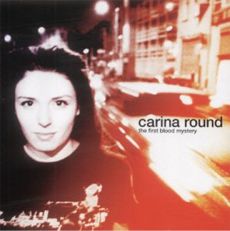
Image © Animal Noise Records 2001
|
|
(19 October 2003) Carina Round's The First Blood Mystery(Animal Noise (UK) ANICD114, 2001) garnered some extraordinary reviews when released in 2001. The Sunday Times reviewer called it "One of the most extraordinary debut albums I’ve ever heard - absolutely brilliant." Other words used across the music press were "striking, strange, invigorating, sexual and intimidating." Carina mentions Nina Simone and Led Zeppelin as formative influences and although she has a distinctive sound of her own, echoes of these diverse artists can be found within the songs. Gigging outwards from her native Wolverhampton, this Anglo-Italian, singer / songwriter / guitarist has built a strong following based on her powerful and emotional live performances. When it came to recording her debut album Carina wanted to keep the freshness and edginess that marked those concerts. She succeeded by recording it in only 10 days and by not revealing some of the songs, all of which are self-penned, to her confederates, Simon Smith (stand up bass) and Marcus Galley (drums) until the day of recording. Jazz influences are apparent on the opening track "Message to Apollo" and also on "How I See It." The former has a jazz-inspired backing to the verse, before the chorus moves into the rock arena. The spoken section is something many other artists have used, Heather Nova, Natalie Merchant, Kirsty MacColl, but Carina takes it a stage further by first speaking and then singing a cross rhythm. "How I See It" uses muted trumpet and brushes on the drums to good effect has some fine harmony vocals from Christine Van Dyke. The gentle keyboard opening to "Lightbulb Song" gives plenty of space to Carina’s voice. There are places on this album, notable here and on the acoustic guitar driven "Let It Fall," where her voice is strongly reminiscent of Heather Nova's vocal style on albums like Glowstars. There's some interesting use of flute on this track which momentarily echo the recorders on Led Zeppelin's "Stairway To Heaven." There’s great variety in this song and a distinct lack of a conventional structure, both of which work in its favour. "The Waves" has some impressive vocal work with Lucy Mallet's flute again adding colour and interest. The sparse and subtle use of additional instruments, flute, trumpet, accordion add greatly to the album but still the string quartet on the beautiful "Ribbons" comes as a surprise. But Carina has saved the best for last. The gentle acoustic opening to "On Leaving" gives no hint of what is to come. Carina has said that rather than go to school she preferred to stay at home and sing along with Led Zeppelin's "Physical Graffiti" at the top of her voice. If this kind of thing is the result, then it should be made part of the National Curriculum. There's a long, slow, relentless build to a breathtaking climax. The vocals are utterly and wonderfully terrifying, the kind you don't just hear, but live every moment of. Ultimately the song leaves one feeling exhausted, exultant, devastated and completely in awe. Two years on does The First Blood Mystery still seem worthy of the accolades heaped upon it on its release? For the most part, yes. Carina certainly wears her influences lightly and has found a voice of her own much earlier than most young artists. Perhaps one of the more interesting things about the album is that while as a whole it is very memorable, individual tracks are less so, lyrics don’t stick in the mind, melodies don’t haunt you--yet at the end of it you know you’ve been listening to something very special.--Jamie Field Read further reviews, listen to soundbites and orderthe album from amazon.comhere. An album certain to draw interest to Carina Round, especially with her 2003follow-up just released, further investigation is certainly worth a journey. An album certain to draw interest to Carina Round, especially with her 2003follow-up just released, further investigation is certainly worth a journey.
|
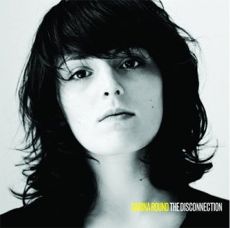
Image © Dehisce Records (UK) 2003
|
|
(updated 08 December 2004) The most noticeable maturing onThe Disconnection (Dehisce Records (UK) DEHIS CD 001, 2003), Carina’s second album, from her debut The First Blood Mystery is a far greater vocal control and confidence, evident right from the off, and the song writing shows far greater melodic awareness--there are terrific choruses on this album, something her debut lacked. One of the most attractive aspects of the songs is the sense that the words and music are one entity--the sum is far greater than the parts, that the emotion of the whole is more important than the specific words she uses to express it. It doesn’t always make for easy listening and there are times where the words don’t sit comfortably with the melody. That's not to say there aren’t moments of lyrical clarity and insight, for example in 'Paris' she sings "I know broken bones don't come close to the pain of hidden truths." and the chorus of "Into My Blood," "I wait all my life just for the rush, the passing of fire into my blood." The unconventional structure of some of her song writing suggests that the songs are dictating to her how they should be written, and sensibly, she’s not arguing. The best way to listen to Carina is simply to go with her feel and emotions and not to try to separate the words from the music. In spite of the distinctive jazz style of the vocals on the first track "Shoot," and a number of the other songs, the powerful drum opening is an indication that it's rock influences hold sway on The Disconnection. The first single taken from the album, "Into My Blood," is a stunning song, boasting a powerful, raw sound, a tremendous vocal performance and a chorus that's instantly branded into you brain. This is followed by "Lacuna," another superb song with the sparse drum/discordant piano opening leading to a memorable, brass-soaked chorus. Great rhythm, great feel--though the guitar solo seems unnecessary and ponderous. "Paris" has some punchy offbeat brass giving a lovely ska feel and the French capital features again in "Monument," when again the driving brass is used thoughtfully. “Motel 24” is a beautifully arranged slower track, with a sparse melodic chorus and some well thought-out dynamics. Simon Smith's bass is well to the fore in the mix. "Overcome" is an acoustic based song with brass giving way to strings. It takes a while for this song to find its feet, but when it does, it moves with a slinky, sexy rhythm. "Sit Tight" is the most atmospheric track on the album, opening with an ambient feel. It’s a very thoughtful piece of music, wonderfully constructed. Together with "Into My Blood," it's probably the highlight of the album. After the complexity of the previous track, the sparseness and simplicity of the closing song "Elegy," reminds us Carina built her live reputation very much on a 'girl and guitar' basis. There’s some sweet harmonies and an overall feel that brings to mind Rickie Lee Jones--though the choice of clarinet for the solo struck a false note--maybe the flute, as an echo from the first album, or a soloist from the brass section, would have been a wiser choice.Overall, this one of the strongest albums I've heard in a long time, and with it, Carina Round can stake a claim to be the leading British singer/song writer (of either sex). And there's still much more to come. Listen to this album. It's brilliant. -- Jamie Field
|
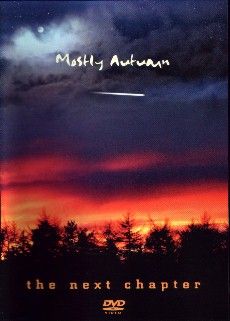
Image © Classic Rock Legends 2003
More Mostly Autumn Reviews
Passengers
(plus additional links)
Live at The Grand Opera House, York
|
|
(19 October 2003) DVD Review.Mostly Autumn return to DVD with The Next Chapter(Classic Rock Legends (UK) CRL 1120, 2003), a compilation of clips from live performances during 2002, some brief interview footage and a few filmed video sequences, leading up to some sequences shot during rehearsals for the wonderful new Passengers(review)album. The live sequences are interestingly varied, and are on the whole excellent. The DVD opens with "Overture (Forge of Sauron)" and "Greenwood the Great" from the Mean Fiddler, London in Spring 2002. I was at this performance, and it was marred by a mysteriously shaking lighting rig, caused by the band playing upstairs in the Astoria, which set the band on edge. Thankfully, the surviving footage is of good quality, as is this opening performance, particularly thanks to a lovely vocal performance from Heather, full of warmth and depth. After a brief and rather awkward looking interview sequence of a totally drenched band in the Borrowdale valley, in the delightful Lake District area of England, the DVD cuts straight into a video sequence of the band miming to "The Gap is Too Wide." The scenery is lovely (as is Heather Findlay!) but the image of Brian launching into a mimed guitar solo standing next to a tree, I am afraid, doesn’t really work for me. A brief sequence of the band talking about their trip to the USA later in the year, is followed by two live performances from the concert in Trenton, New Jersey (review) of "Never the Rainbow" and "Noise from my Head." These are slightly rough, but energetic, with Heather clearly suffering from sound problems which slightly affected her vocal performance.The DVD then switches to an excellent outdoor performance of "Please" and "The Last Climb" at Canterbury Fayre in August 2003. The illustrative video footage for the latter is somewhat embarrassing and the sequence would have been better off not attempted at all. "Shindig / Haste to the Wedding," performed by a then only slightly rattled band later in the set at the Mean Fiddler is next up, followed by a great version of "The Spirit of Autumn Past" from the same gig (note not in Trenton as the DVD cover suggests) with a rather more successful video sequence shot in Central Park. A further video sequence from Borrowdale illustrates the lovely "Prints in the Stone," followed by an excellent "Mother Nature" from Canterbury. I’m not so sure about the rain-swept Borrowdale visuals, though. The DVD ends with the very average video for "Something in Between" from Passengers, and a mimed sequence for "Goodbye Alone" with the band around a camp fire. This may have been very atmospheric when the band were there, but sadly it fails to come across on film. A bonus track shows Bryan Josh guiding us round their countryside rehearsal studio, and features a video performance of "Pure White Light," also from Passengers. Fans will certainly want this, and the live performances are, in the main, excellent and well shot. Songs like "Mother Nature" have certainly developed live since their first performances and some of the songs not seen on DVD before are worth having. Some of the nature footage is also good, and works well with the music. Where the DVD fails, however, is in its additional footage. Out of context miming, like much of the Borrowdale footage, rarely works, and here it often looks cheap and slightly amateurish. I always think that if in doubt, stick with the in concert footage because you are on much safer ground. So, to new viewers I would suggest the excellent Story so Far DVD. To fans, this is flawed but still well worth having.--StephenLambe Read further reviews, listen to soundbites and order this  DVD from amazon.comhere. While the DVD is a must for established fans, it is also worth a journey for newcomers. DVD from amazon.comhere. While the DVD is a must for established fans, it is also worth a journey for newcomers. The Grand Opera House, York20 September 2003 Concert Review. They played: "Overture – Forge of Sauron," "Greenwood the Great," "Nowhere to Hide," "Caught in a Fold," "Goodbye Alone," "Evergreen," "Heroes Never Die," "Winter Mountain," "Dark before the Dawn," "Answer the Question,""Passengers," "Distant Train," "The Gap is Too Wide,"Bitterness Burnt," "Spirit of Autumn Past," "Never the Rainbow," "Smoke on the Water," "Comfortably Numb," "Pass the Clock" and "Mother Nature." This was one of those concerts that you just had to go to. Mostly Autumn, back in their home town, promising special guests, special effects and a special set. We were not to be disappointed.The Grand Opera House in York is unspectacular on the outside, but inside it is lovely--the sort of well-maintained, ornate provincial theatre that the British do so well. With a capacity of 1000 (and an excellent turnout on this rainy Saturday), it is spacious, yet intimate--perfect for Mostly Autumn. As soon as the intro to "Overture" from Lord of the Rings sounded, we knew we were in for a great experience. A large projected video display flashed familiar images based on Tolkien's book. Then, suddenly, the band were on stage playing their hearts out. Throughout the concert, the video projections were well done--withimages from nature and space--at one point footage from Fritz Lang's Metropolis were used. The projections always complimented the music and never detracted from it. In addition to the regular band, a string quartet, playing behind a transparent screen, were on stage, sometimes playing as a unit, sometimes as individual musicians. Early in the set it became clear that I was witnessing an extraordinary performance, since the band were at their very best, well-rehearsed and really fired up for the concert. The set has now become very balanced, many of the songs from Passengers, having been road tested, have now been dropped for older pieces, leaving songs like "Caught in a Fold," with its aggressive flute, to light up the set. Better still, the band had never sounded better. The concert was superbly mixed and the PA did them proud. I could hear every note. Though there was plenty of passion throughout the performance, the first unusual offering was "Goodbye Alone" also from Lord of the Rings--here beautifully performed with some lovely violin. "Heroes" was played without its gentle intro, presumably for timing reasons, and "Passengers," with Heather Findlay on top vocal form, was superbly augmented by some very cosmic visuals. Iain Jenning's "Distant Train" works surprisingly well live, with a lovely Celtic flute interlude from Angela Goldthorpe. Next came the centrepiece of the set, and the piece we had all been waiting for--a performance of "The Gap is Too Wide" from The Spirit of Autumn Past album. Aside from the band and the string quartet, a 10 piece choir was employed alongside the versatile Troy Donockley from Iona, whose Uilleann pipes are vital to the piece. This performance was note perfect and full of emotion. The audience responded with a standing ovation. I was in tears. Troy hung around for another surprise--a lovely "Bitterness Burnt," plus some end of set fun--a version of "Smoke on the Water" played dead straight with some good guitar from Troy and a Blackmore-like solo from Liam Davidson. Next up was the band's legendary version of "Comfortably Numb" with Heather as Roger Waters and Bryan Josh as Dave Gilmour (no surprise there). "Pass the Clock" ended the set in epic style. After fierce backstage negotiations, the band were allowed back for a wonderful "Mother Nature." So, two and a half hours of astonishing, emotional music from a great band at the peak of their powers. I have to say, this was one of the best concerts I have ever seen – and I have seen hundreds. Thankfully, the even was filmed for a DVD to be released in November, but I am proud to say that I was there. I’ll never forget it.--Stephen Lambe
|
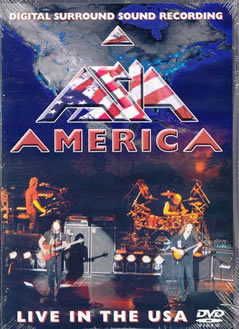
Image © Classic Rock Productions 2003
|
|
(28 August 2003) Asia Live in the USA (Classic Rock Productions (UK) CRP1044, 2003)is a two-CD set that was recorded in Trenton, NJ at the first day of the Classic Rock Festival (review)on October 5, 2002 during their tour in support of their latest studio album Aura. An accompanying DVD entitled Asia America Livein the USA (ClassicRock Productions (UK) CRP1034, 2003) of the performance is also generally available in both PAL and NTSC formats. Asia's current lineup consists of Geoff Downes(keyboards), John Payne (bass and lead vocals), Guthrie Govan (guitar) and Chris Slade (drums).The classic track "The Heat Goes On" from the Alpha album opens the show. It has been a fan favorite for 20 years now. This track features what is probably Geoff’s best Hammond solo and he really shines on this track. "Days Like These," with its catchy chorus follows and is perfectly suited for John Payne's voice. "Awake," the first single from the new Aura album follows. It features some beautiful piano work during the middle bridge as well as a classic Moog solo from Geoff. "Arena" from the album of the same name also features some fabulous Hammond work from Geoff and a stunning guitar solo from Guthrie who somehow manages to make one guitar sound like an arsenal of guitars. "Military Man" an explosive rocker from the Aria album features an electrifying guitar solo from Guthrie. Chris Slade really shines on this track effortlessly switching from a rock backbeat to a military style drum march during the middle section. "Wherever You Are" also from Aura (co-written with Andrew Gold formerly of 10cc) is a solid AOR radio-friendly track once again allows Guthrie to really let loose at the end of the song. A reworked version of "Who Will Stop The Rain" from Aqua and also the first track that Geoff and John wrote together follows.A punchy Moog lead starts off the song followed by stunning vocal harmonies. "Bad Asteroid," a jazzy/funky piece, features fabulous interplay and trading solos from all four members and sounds more like Al Dimeola than Asia. "Don't Cry" closes the set and while it's a little stiff compared to the popular studio version, it holds up nicely. The second CD starts with one of the two standout tracks fromAura, "Kings of The Day." This may very well be the best Asia track from the Downes/Payne era. The song starts with a funky rhythm line from Geoff which follows throughout the song. Guthrie performs what is probably his most impressive and melodic solo during the middle bridge. This version varies from the studio version during the end section as Geoff plays the melodic guitar line on piano and the result is simply stunning. Vocal harmonies at the end of the song are brilliant. This is one of those tracks that rewards the listener big time with repeated listenings. A keyboard solo from Geoff follows in the vein of his electronic "Light Program" CD which then goes into the solo piano part from "Cutting It Fine," a fan favorite since 1983. A medley consisting of "Love Under Fire / Sad Situtation / Longest Night" perfomed by Geoff on piano accompanied by John on vocals slows things down a bit and allows a reworking of some Asia classics perfectly suited for piano and vocals. "Ready To Go Home" from Aura features a blistering solo from Guthrie as does "Sole Survivor," a classic from the 1983 debut album. "Free" an 8:30 prog epic also from Aura is the crowning glory from the show. Starting at a frantic pace with lead synth and guitar interplaying with drums and bass holding up the rhythm section this song represents the very best of Asia. John Payne has never sounded better. The middle break is absolutely stunning with gorgeous Hammond organ and synth. Guthrie’s lead guitar over Geoff's keyboards is exquisite. Chris Slade's drum work is nothing short of spectacular bringing this piece to a powerful end. This is a most difficult piece to play live and the band pulls it off brilliantly. "Only Time Will Tell," a classic rock staple, is the first of three encores. "Go" from the Astra album is reworked with excellent results. John Payne sounds right at home singing this track from the Wetton/Downes era. Geoff and Guthrie trade licks at the end of the track bringing this classic to new heights. "Heat of the Moment," Asia’s very first single closes the show and makes for a very fine ending to a great performance. Read further reviews, listen to soundbites and order the album from amazon.comhere.The accompanying DVD can be ordered from amazon.comhere. All in all this was obviously an excellent show and thetwo-CD set that commemorates it is a very worthwhile purchase for fans of Asia and progressive rock.--Scott Bassin All in all this was obviously an excellent show and thetwo-CD set that commemorates it is a very worthwhile purchase for fans of Asia and progressive rock.--Scott Bassin
|
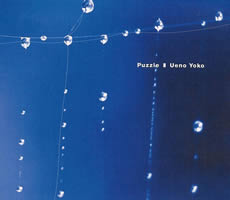
Image © Victor Entertainment (Japan) 2002
|
|
(17 August 2003) It may have been Karl Jenkins of Adiemus (reviews 1,2,3) who was the first composer that succeeded worldwide by writing songs with totally phonetical and purely meaningless lyrics, and it seems to be a creating a method which other composers have taken on. This is also the case with Yoko Ueno, an outstanding, rising singer-songwriter from Japan, and particularly her album Puzzle (Victor Entertainment (Japan) VICL 60821, 2002). Prior to hearing this album, I had never heard Yoko Ueno's music nor anything about her other musical things, though I have been listening to some other Japanese female crossover artists (Eri Sugai (review) and her project Stella Mirus (review) as well as Eri Kawai) whose music are similar than Yoko Ueno's. Each of these artists do use more or less made-up, invented languages as well as multi-tracking of the voices, and although some listeners could state that their music is too similar to each other, I think that it isn't so at all. The album starts off with "Slither Link," a wonderful Asian-flavoured piece with synthesized percussion after an a cappella introduction. The piece draws influences quite heavily from Karl Jenkins's Adiemus compositions, both rhythmically and melodically, reminding me very much of his song "Beyond The Century." The result is a very ear-friendly piece, and I bet that the refrain is very easily hummable because it is so catchy! "Maze" is a more meditative and serene one, although the beginning of it features some modern tonality. Toying with the human voice and other instruments made me to ask "what's next?", but I mean it only in a positive way. Irish music fans like myself may find the usage of the Uilleann pipes very interesting in here. "Polyomino" is mainly based on vocalise. The multi-tracking brings the piece into yet further dimensions, and gives the listener a great amount of sudden understanding about how human voices can really be used in music. What a composition and a performance! "Seek Wards" then is a very ear-pleasant piece, maybe because of its simple and flowing melody and minimalistic accompaniment. Yoko Ueno may certainly have not heard any music from the debut album of Finnish group ZetaBoo, but somehow I was able to hear very many things in common with a certain ZetaBoo (review) piece, namely "Maria"! A real delicacy for everyone's ears. In addition to Asian and Celtic flavours, there are also some mediaeval influences which have been finely cultivated in "MacMahon." A pulsing rhythm and the usage of a recorder-like reed instrument fits like a glove. The harpsichord and Yoko's singing completes it all, and the finger cymbals give some Asian flavour in as well. In "Sumcross" multi-tracking has been used and. rhythmically thinking, all the voices form a complex structure. The track "Tower of Hanoi", oddly transfers my thoughts into totally different place, namely, somehow the singing style of this song reminds me very strongly about Lapland and the Sámi singing style also known as the yoik. The Sámi people use similarly overlapped vocals, harmonies and rhythmical drumbeats in their yoik, and because yoik music is nowadays quite well-known outside Lapland as well, I think that the influences have become very universally used indeed. "Flexagons" represents the melancholic side of this album, being quite slow and written into a minor key. I don't like is the "heavy" percussion synthesizer sounds that are present throughout the song, but other listeners can say that they suit to the piece. "Number Place" may have something in common with Karl Jenkins's Adiemus music. Whereas Karl's "Chorale VI - Sol-Fa" from Adiemus II Cantata Mundi is based on the musical names of the intervals (named by a Hungarian composer Zoltán Kodály), the lyrics of this piece probably are the notes of the scale. The overlapping of the voices makes the piece interesting, and although the melody is quite modern in terms of tonality, it simultaneously glues the listener to his/her place without letting one to pause the listening. Hypnotizing. "Shmuzzle" is a very interesting piece that brings the listener back to softer moods with a solo voice, percussion, acoustic guitar, the Uilleann pipes and synthesizers, which perform a probable lullaby. Lullaby indeed, though somewhere in the middle the piece grows into a moderate-tempo dance. A great mixture of Celtic and other world music influences, which nearly reminds about some instrumental pieces of Secret Garden (reviews 1, 2). "Tangram" is very peaceful number, and as the title indicates it has included some Japanese influences. Yoko Ueno's voice is multi-tracked, and in addition she uses typical Asian melismatic passages as well as the pentatonic (5-note) scales. The middle section of the piece reminds hugely the style of Adiemus again, with repeated triplet rhythm patterns, similar harmonies, lyrical style and the use of percussion instruments. "Tic-Tac-Toe" concludes the album. It is a fast and quite tribal-sounding song with some imitation of vocal drums and fair amount of scat singing. Some listeners may find the piece too modern in terms of tonality, but for me it was a very exciting experience. The most surprising thing on this album is, that although there are so many different influences drawn from many (musical) cultures, it doesn't make the album's pieces too diverse. Therefore it's a big pity that Yoko Ueno's music is not so well-known outside Japan, since at least this album would interest many non-Asian people as well. It is a must listen for any serious crossover music enthusiast.--Suvi Kaikkonen
|
|




















